托福雅思培训资料
新托福考试各阶段备考书籍资料详解
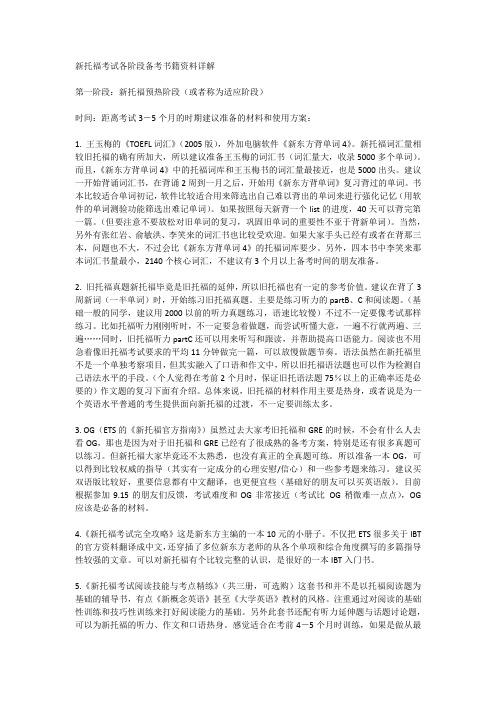
新托福考试各阶段备考书籍资料详解第一阶段:新托福预热阶段(或者称为适应阶段)时间:距离考试3-5个月的时期建议准备的材料和使用方案:1. 王玉梅的《TOEFL词汇》(2005版),外加电脑软件《新东方背单词4》。
新托福词汇量相较旧托福的确有所加大,所以建议准备王玉梅的词汇书(词汇量大,收录5000多个单词)。
而且,《新东方背单词4》中的托福词库和王玉梅书的词汇量最接近,也是5000出头。
建议一开始背诵词汇书,在背诵2周到一月之后,开始用《新东方背单词》复习背过的单词。
书本比较适合单词初记,软件比较适合用来筛选出自己难以背出的单词来进行强化记忆(用软件的单词测验功能筛选出难记单词)。
如果按照每天新背一个list的进度,40天可以背完第一篇。
(但要注意不要放松对旧单词的复习,巩固旧单词的重要性不亚于背新单词)。
当然,另外有张红岩、俞敏洪、李笑来的词汇书也比较受欢迎。
如果大家手头已经有或者在背那三本,问题也不大,不过会比《新东方背单词4》的托福词库要少。
另外,四本书中李笑来那本词汇书量最小,2140个核心词汇,不建议有3个月以上备考时间的朋友准备。
2. 旧托福真题新托福毕竟是旧托福的延伸,所以旧托福也有一定的参考价值。
建议在背了3周新词(一半单词)时,开始练习旧托福真题。
主要是练习听力的partB、C和阅读题。
(基础一般的同学,建议用2000以前的听力真题练习,语速比较慢)不过不一定要像考试那样练习。
比如托福听力刚刚听时,不一定要急着做题,而尝试听懂大意,一遍不行就两遍、三遍……同时,旧托福听力partC还可以用来听写和跟读,并帮助提高口语能力。
阅读也不用急着像旧托福考试要求的平均11分钟做完一篇,可以放慢做题节奏。
语法虽然在新托福里不是一个单独考察项目,但其实融入了口语和作文中,所以旧托福语法题也可以作为检测自己语法水平的手段。
(个人觉得在考前2个月时,保证旧托语法题75%以上的正确率还是必要的)作文题的复习下面有介绍。
学为贵雅思:雅思备考资料

学为贵雅思给不同雅思水平阶段的考生推荐备考书籍许多烤鸭对于雅思学习的教材有着各种各样的疑问:这本书写的是什么?我应该买什么书?今天小贵贵就为大家介绍一下咱们学为贵的雅思真经教材,并为不同阶段的你做一个修炼手册的推荐!一.听力真经修炼手册1.《雅思王听力真题语料库》语料库是每个烤鸭的必备书籍,语料库中所有材料首先建立在对2015年之前所有的语言类书籍的研究成果,特别是对剑桥1-10计算机分析成果之上还包括广大考生所提供的考试回忆。
书里面归纳总结了许多的听力考点词包括:名词,动词,形容词,数词,字母,词组等,这些词都是雅思考试中会听到甚至需要写出类的单词。
王陆老师独创的点听,复听,魔鬼跟读法在这本书上都有详细的使用说明和介绍。
本书适合听力基础比较薄弱,刚刚接触雅思的“小白”,建议没有考过雅思的考生先用语料库打好单词基础,在此之上再加入听力技巧的使用,并用剑桥真题来做考前模拟。
2.《剑桥雅思听力考点词真经(剑10版)》所谓考点词就是在测试环节中表征测试目的的词汇。
雅思听力考试题目的本质和雅思阅读一样,是考查考生的同义替换能力。
而这本听力考点词真经就是总结了剑4到剑10真题中,所有题目所对应的同义替换词。
这些同义替换是剑桥官方要求考生所必需掌握的听力词汇,也是雅思听力考试的精髓。
这本书在总结这些考点词的基础上还配有词汇的音频。
本书有两种排列形式,一种是按照雅思真题的分类方式,一种是按照九宫格的方式排列。
无论是哪一种排列方式,都可以作为考生记忆和自我测试的工具。
本书适合具备一定词汇量,并已经开始做雅思真题的烤鸭。
建议在做完一套真题后,对照本书中这套题的考点词来进行归纳,总结。
这样才算真正做完,做懂一套雅思真题。
二.口语真经修炼手册1.《雅思口语冲击波之提分宝》想要说出一口流利的口语,前期的输入过程是必不可少的,这本书为烤鸭提供了输入过程所需的词组,加分句,逻辑框架等。
如果是刚刚入门的小烤鸭,首先需要掌握的就是万能功能句,以及跟着刘波老师亲自录制的音频跟读背诵;如果是基础段的烤鸭,重点在地道的词汇,词组,常用语法以及回答题目的逻辑方面,所以要掌握词汇加分句,语法加分句和答题逻辑,熟能生巧,提高流利度。
【托福】新东方托福阅读讲义
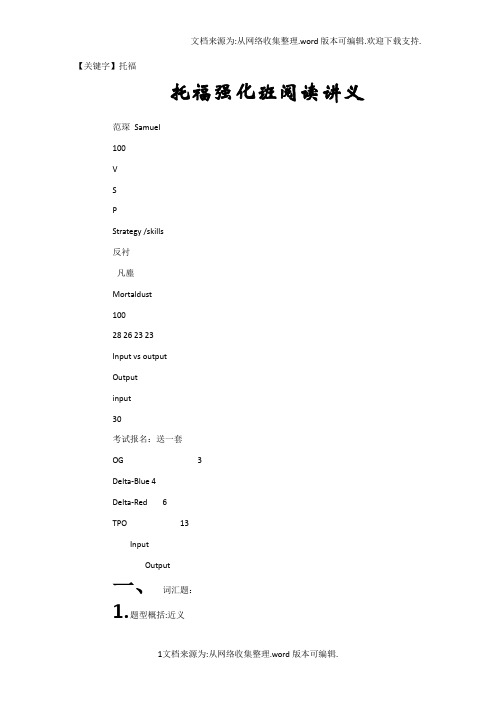
【关键字】托福托福强化班阅读讲义范琛Samuel100VSPStrategy /skills反衬凡塵Mortaldust10028 26 23 23Input vs outputOutputinput30考试报名:送一套OG 3Delta-Blue 4Delta-Red 6TPO 13InputOutput一、词汇题:1.题型概括:近义2.解题思路i.“生僻”词汇ii.熟词僻义iii.上下文理解5%Context3.备考提示数量词源词性i.背诵词汇的优先顺序a)通用的V & Adj,特别是已经学过的简单词汇的升级版(书面语b)常用的名词c)专有名词jargonii.背单词的方法:词根词缀iii. B. Delta p63-p66Vocabulary Builder4.例题OG 43-11,B.Delta 72-8, 73-9, 73-1, 74-3*, 75-8/9, 76-2, 79-,Dis-banded band dismissSophisticatedUniqueBan brandSophisticatedDis-band-edUniqueThis custom is unique to the southwestern aboriginal tribes.=only found inXXXXX (风俗) is unique to XXX Tribe.二、指代题1.题型概述i.基本原则:a)代词指名词b)代词通常指前(相邻句子)没有歧义:同一句相邻句子:两句话c)单复数一致代词指后When he returned to homeland, the ambassador embarked on anew course.主从句/主句+状语从句/状语在前,主句在后,则名词完整形式放主句中,代词放从句/状语中2.解题思路代入检查i.主语同指主1 xxxxxxxx. 主2(代词)xxxxx ii.上下文理解112-43.例题OG 42-5 62-9 71-5 92-2Delta 48-1/2 49-4 51-1 52-6三、插入题:1.题型概述2.解题思路i.代词(指代)黑体句句首:代词+名词→原文(重复/同义替换)黑体句首有This→段落最开头的方格必错ii.总分/隐含先后关系a)明显标记词(之后的名词) Both, also, again, another; a third, finalb)先抽象后具体●在抽象句子开头有结论性词语,则颠倒顺序Thus, in conclusion, consequently…c)A of B = B’s Ad)要比较先介绍A: xxx, B: xxx A>B三转折13ChaosSalonUltimate clue: Cohesion between ‘Repeated’ nouns3.例题OG: 43-12 52-12 63-12 84-11 107-11 114-12 指代73-11 95-11 121-11*Delta:143-7/9(先抽象后具体)144-10 (both) 145-3(AofB) 146-6(要比较先描述) 147-8(先整体后个体)486-39* ,514-38*,538-24,红Delta:36-2444-49 210-24四、句子改写(简化)1.题型概述Essential Infoi.主谓宾ii.逻辑关系条件/因果/转折/对比/比较级2.解题思路i.简单句筛选主’谓’提示:竖读选项排除具有相同错误的选项看上文:◆句首代词◆主语内涵不明◆呼应结构(also)ii.并列句筛选主谓宾小心:并列句原句前短后长,答案将对原句进行缩减,要把握句子重心And ;➢原句隐含关系在选项表面化分词→结果/原因/目的/伴随iii.复杂句抓住原句逻辑关系词筛选选项3.例题Delta:一124例题131-7 135-7;128-2* 129-4*(看上文)二126-7 128-1 130-6* (错项)130-5*(分词/隐含关系)三127例题131-8 133-3 135-10OG:一93-7二81-2*(句子重心的把握)三43-10 51-10 60-3 72-8*(whereas)106-10 112-6* 120-9 Respectively五、细节题纯粹细节Infer否定(先看选项,观察共性) EXCEPT NOT细节题重大出题点:i.相似性/差异性描述As …as比较级The same, similar, different, like/unlike关系/内容ii.否定信息/强调信息否定/最高级、绝对化表达、each /every,强调语气、强调句iii.逻辑关系改变转折iv.从结构看细节2.错项特征i.新概念ii.新逻辑(小心隐含)iii.绝对化表达only all 最高级never always(原文没有)3.例题OG 41-1*/2* 61-6* 81-1* 51-11 105-9**(逻辑关系转变)OG 43-9* 92-5* 42-7/8红Delta 213-26*蓝Delta449-10*六、修辞目的Why/in order to1.答案特征功能&对象(同义替换)2.解题思路i.例证关系:a)标记词such as, for example,e.g. –PrevailPrevailb)对称/相似结构描述同类现象,往前找答案ii.相似性/差异性:判断关系确定内容A VS B:为啥提到A: 为了B (互为目的)为啥提到A:为了告诉你B是XXX(= / 不= A)Delta:108-1 112-2 OG 92-3 60-3 iii.逻辑关系的另外一半A 细节与B细节用逻辑关系词相联,两者互为目的。
新东方托福资料

北京新东方全部托福资料(词汇,听力,阅读,写作,口语还有对应软件免费版)都给你总结好了,附带全部链接,分享的同学一定是100分以上。
有了它,就不用花钱去书店了。
就不用花钱买软件了!!!词汇类李笑来TOEFL核心词21天excel版下载链接:(/HorseUpfiles/month_0712/20071211_bf54b359d01f5087df89XWGMBWh8L1rd.rar)文件大小:84.95KB李笑来TOEFL核心词21天MP3下载链接:(/HorseUpfiles/month_0709/20070911_0554b919aaf1d0107749XwfVpzof7oVr.rar)文件大小:23.92MB熟词偏义词汇列表下载链接:(/HorseUpfiles/month_0710/20071016_de4fa88310782460e1e4tiFlsNuX7uLi.zip)文件大小:12.42 KB老俞托福词汇串讲(网络课堂)帖子链接:/bbs/thread-2571-1-1.html俞敏洪Tofel单词串讲(非网络课堂)下载链接:(/HorseUpfiles/month_0709/20070911_ef4045d5846bcbbe1a77lCURXvPKRmAe.rar)文件大小:48.79 MB俞敏洪托福词频(文本文档)下载链接:(/HorseUpfiles/month_0708/20070830_4d7d3225bdd91a028debt77gEeKJm1YU.rar)文件大小:1.4 MB老俞托福词汇2004版下载链接:(/HorseUpfiles/month_0708/20070830_69869346dfb2b8a18545obsqqCAxmeAH.rar)文件大小:77.16 KB托福词汇词根联想下载链接:(/HorseUpfiles/month_0709/20070908_b670f6bc04a7bc041574T3xA58b70qE7.rar)文件大小:77.16 KB新东方词根词缀大全下载链接:(/HorseUpfiles/month_0805/20080522_d21bb77d87c70ee6116bTyBMjykr8xFl.rar)文件大小:216.94 KB说明文字:背单词其中一个很重要的方法,就是词根词缀记忆法,解压后为word格式,用C trl+F来搜索你需要的词根的意思,当成字典来用吧.赵丽8000词汇笔记下载链接:(/HorseUpfiles/month_0710/20071027_00f355ca8033ba07cdb7Aicpkxg7IuHy.rar)文件大小:26.59 KB口语部分新东方口语特训文本(T1&T2)下载链接:(/HorseUpfiles/month_0708/20070830_5d7feab94900d55b6b0ckYyiP36FSz9n.rar)文件大小:27.37KBXDF十一特训口语部分的PPT帖子链接:/bbs/thread-4817-1-1.html新东方toefl口语训练下载链接:(/HorseUpfiles/month_0709/20070911_efa51ec80e5b1388fd99T3bopkBxRAF4.rar)文件大小:157.22MB托福IBT之路:从开始复习到10月27日详细机经【long】(zz)帖子链接:/bbs/thread-4885-1-1.html听力部分邱正正托福听力网络课堂下载链接:(/HorseUpfiles/month_0711/20071118_94bcabc905b08554521dSYVIdQhERwuD.rar)文件大小:87.92 MB说明文字:老托福的网络课堂,SWF文件可以用暴风影音打开托福听力网络课堂配套教材帖子链接:/bbs/thread-1583-1-1.html邱政政听力笔记下载链接:(/HorseUpfiles/month_0712/20071228_24c8f76bcd948499bbd6gZZmngePA7Ow.rar)文件大小:558.35KB说明文字:配套上述网络课堂的笔记马骏07年1月托福强化班笔记下载链接:(/HorseUpfiles/month_0804/20080404_2bac11b562896b12c5a70LjAbO36wCT6.rar)文件大小:10.87KB宁滨老师听力笔记下载链接:(/HorseUpfiles/month_0710/20071013_c35fd2f526f6f89552c75syUjpU1TadA.rar)文件大小:44.29 KB说明文字:宁滨是新东方托福特级教师,主讲听力和口语,是他的听力课堂笔记托福听力笔记下载链接:(/HorseUpfiles/month_0805/20080514_ca6009fbb6f2e7f4fb5cndWu3MR7aZcp.doc)文件大小:55 KB[转帖]gter托福听力笔记下载链接:(/HorseUpfiles/month_0709/20070911_252cb0108f463569d40auVF0pTtBWSPR.rar)文件大小:7.63 MB写作部分孙远托福作文(网络课堂)帖子链接:/bbs/thread-771-1-1.htmlredrock托福作文(网络课堂)帖子链接:/bbs/thread-772-1-1.html新东方作文课ppt(戴云的)帖子链接:/bbs/thread-4598-1-1.html说明文字:跟随我们的戴教主系统的学习TOEFL写作, 其中包括戴云网络写作课堂的讲义(最全讲义), 以及他给他的教徒们准备的资料、提纲。
北京新东方全部托福资料
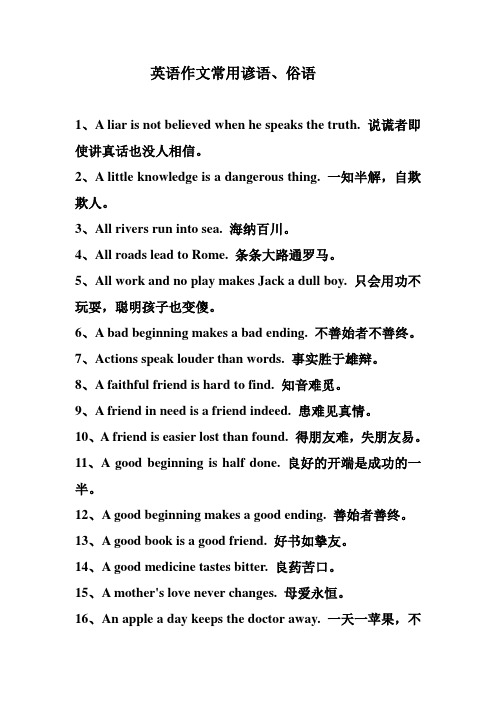
英语作文常用谚语、俗语1、A liar is not believed when he speaks the truth. 说谎者即使讲真话也没人相信。
2、A little knowledge is a dangerous thing. 一知半解,自欺欺人。
3、All rivers run into sea. 海纳百川。
4、All roads lead to Rome. 条条大路通罗马。
5、All work and no play makes Jack a dull boy. 只会用功不玩耍,聪明孩子也变傻。
6、A bad beginning makes a bad ending. 不善始者不善终。
7、Actions speak louder than words. 事实胜于雄辩。
8、A faithful friend is hard to find. 知音难觅。
9、A friend in need is a friend indeed. 患难见真情。
10、A friend is easier lost than found. 得朋友难,失朋友易。
11、A good beginning is half done. 良好的开端是成功的一半。
12、A good beginning makes a good ending. 善始者善终。
13、A good book is a good friend. 好书如挚友。
14、A good medicine tastes bitter. 良药苦口。
15、A mother's love never changes. 母爱永恒。
16、An apple a day keeps the doctor away. 一天一苹果,不用请医生。
17、A single flower does not make a spring. 一花独放不是春,百花齐放春满园。
18、A year's plan starts with spring. 一年之计在于春。
1 托福雅思语法培训-句子种类与结构
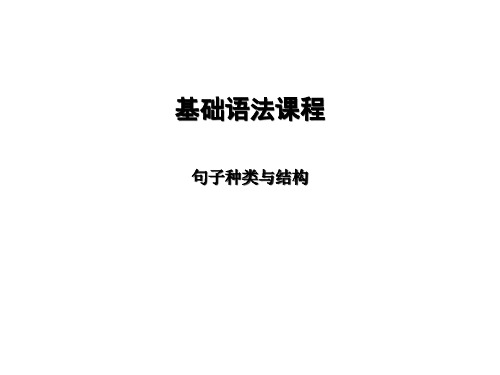
② 特殊疑问句
➢就句中某一部分进行提问。句末用问号,一般读
特殊疑问词(不作主语)+be动词/助动词/情态动词+主语+其他? 特殊疑问词(作主语)+be动词/助动词/情态动词+主语+其他? -Where were you at that time? -When did you arrive there? -How can you do that? -Whose bike is this?
(4) 感叹句
➢表 示 喜 、 怒 、 哀 、 乐 等 感 情 的 句 子 。 一 般 用 h o w 或 w h a t 引 导 。 h o w 做状语,修饰形容词、副词或句子;what作定语,修饰名词(名词 前可有形容词或冠词)。感叹句要用降调,句尾用感叹号。
• What引导的感叹句 What+a/an+形容词+可数名词单数+主语+谓语! What+形容词+可数名词复数+主语+谓语! What+形容词+不可数名词+主语+谓语!
where(何地),why(为什么),how(如何)以及由“how+ 形容词/副词”构成的短语。
-Why did she cry? -How far is it from here to your school? -How often do you go to the cinema? -How much does it cost? -How old are you? -How long have you been in China?
基础语法课程
句子种类与结构
Contents
➢句子种类 ➢句子结构
雅思材料整理
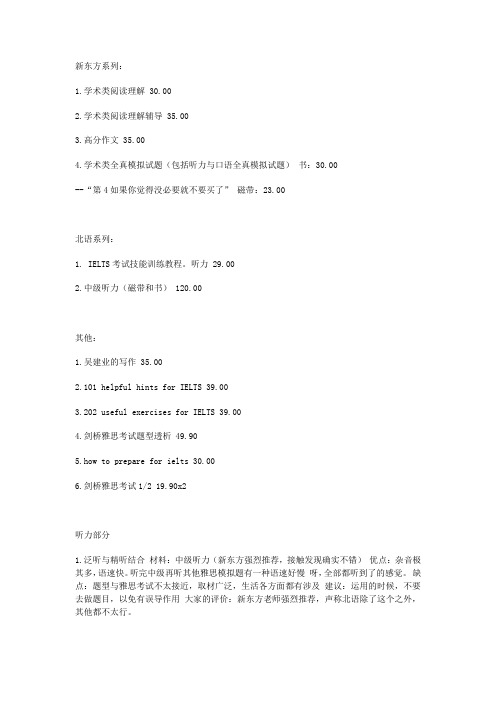
新东方系列:1.学术类阅读理解 30.002.学术类阅读理解辅导 35.003.高分作文 35.004.学术类全真模拟试题(包括听力与口语全真模拟试题)书:30.00--“第4如果你觉得没必要就不要买了” 磁带:23.00北语系列:1. IELTS考试技能训练教程。
听力 29.002.中级听力(磁带和书) 120.00其他:1.吴建业的写作 35.002.101 helpful hints for IELTS 39.003.202 useful exercises for IELTS 39.004.剑桥雅思考试题型透析 49.905.how to prepare for ielts 30.006.剑桥雅思考试1/2 19.90x2听力部分1.泛听与精听结合材料:中级听力(新东方强烈推荐,接触发现确实不错)优点:杂音极其多,语速快。
听完中级再听其他雅思模拟题有一种语速好慢呀,全部都听到了的感觉。
缺点:题型与雅思考试不太接近,取材广泛,生活各方面都有涉及建议:运用的时候,不要去做题目,以免有误导作用大家的评价:新东方老师强烈推荐,声称北语除了这个之外,其他都不太行。
IELTS考试技能训练教程。
听力(黑眼睛)优点:对于没有接触过雅思考试的考友,帮助比较大,因为他把各个题型都归类练习了。
缺点:念的那几个不会变的,不是第一个跟第二个搭配,就是跟第三个搭配,难度比较简单,对后期冲刺的考生其实作用不大。
建议:做的时候要极其注意收集听力词汇,归纳。
准备考的考生基本不用理它大家评价:环球雅思强烈推荐,声称黑眼睛囊括了85%的听力内容。
注:大家应该先听中级听力的,把睡意驱除,一个小时后,再拿出黑眼睛,精听之~~~~2.阅读一定要注意词汇量的积累材料:学术类阅读理解学术类阅读理解辅导优点:帮助记忆单词,是我发现至今最有效的背单词书籍缺点:出题思路跟雅思不太一样,错又多,而且够简单,拿这本书做阅读题的话,大家会死得很惨。
备战雅思常用经典教材哪个好
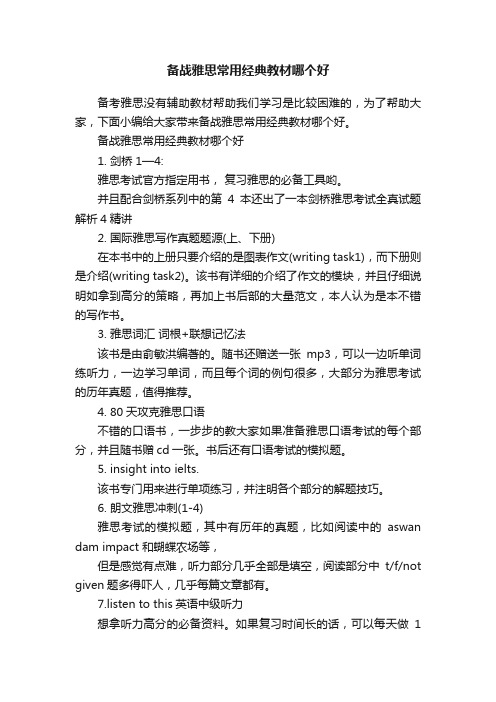
备战雅思常用经典教材哪个好备考雅思没有辅助教材帮助我们学习是比较困难的,为了帮助大家,下面小编给大家带来备战雅思常用经典教材哪个好。
备战雅思常用经典教材哪个好1. 剑桥1—4:雅思考试官方指定用书,复习雅思的必备工具哟。
并且配合剑桥系列中的第4本还出了一本剑桥雅思考试全真试题解析4精讲2. 国际雅思写作真题题源(上、下册)在本书中的上册只要介绍的是图表作文(writing task1),而下册则是介绍(writing task2)。
该书有详细的介绍了作文的模块,并且仔细说明如拿到高分的策略,再加上书后部的大量范文,本人认为是本不错的写作书。
3. 雅思词汇词根+联想记忆法该书是由俞敏洪编著的。
随书还赠送一张mp3,可以一边听单词练听力,一边学习单词,而且每个词的例句很多,大部分为雅思考试的历年真题,值得推荐。
4. 80天攻克雅思口语不错的口语书,一步步的教大家如果准备雅思口语考试的每个部分,并且随书赠cd一张。
书后还有口语考试的模拟题。
5. insight into ielts.该书专门用来进行单项练习,并注明各个部分的解题技巧。
6. 朗文雅思冲刺(1-4)雅思考试的模拟题,其中有历年的真题,比如阅读中的aswan dam impact 和蝴蝶农场等,但是感觉有点难,听力部分几乎全部是填空,阅读部分中t/f/not given题多得吓人,几乎每篇文章都有。
7.listen to this英语中级听力想拿听力高分的必备资料。
如果复习时间长的话,可以每天做1课,1个多月就可以搞定。
并且每课最后部分都有听写练习。
不错,缺点是必须连同教师用书一起买,否则没有听力原文和答案,而且磁带巨多(可以选择mp3)8.北语出的"黑眼睛"系列(听力)北语出的"黑眼睛"系列一直受到鸭鸭们的爱戴,现在已经出了最新版的,内容没有什么变化只是封面换了,这个系列的听力部分除了几套模拟题外,都是单项练习,比如你听字母和数字不好,就可以专门练这个,很实用哟。
- 1、下载文档前请自行甄别文档内容的完整性,平台不提供额外的编辑、内容补充、找答案等附加服务。
- 2、"仅部分预览"的文档,不可在线预览部分如存在完整性等问题,可反馈申请退款(可完整预览的文档不适用该条件!)。
- 3、如文档侵犯您的权益,请联系客服反馈,我们会尽快为您处理(人工客服工作时间:9:00-18:30)。
雅思第一部分:雅思考试总体介绍1、雅思考试组成部分国内英语考试(4-6级)完全不同,所以掌握题型和快速解答就显得非常重要。
考试分4个部分,一般需要两天时间举行。
第一天的上午,全体考生都要参加相继进行的听力、阅读、写作三项考试;第一天的下午和第二天上午陆续举行口语考试。
许多人都觉得一般外地考生会被优先安排在第一天下午,实际上这种观念是错误的,口语考试的安排是随机的,和本地外地考生无关。
笔试开始时,考官会发给考生一张答题卡,正面和反面分别用来回答听力和阅读的题目。
先发放听力卷子,听力完成后卷收回,再发放阅读卷子,阅读完成后,卷子与最早发放的答题卡一并收回。
最后发放写作卷子与答题卡,这里请注意写作部分Task1和Task2的答题位置,避免写颠倒,这在雅思考试中十分常见。
首先进行的听力考试时间40分钟,题目分四个部分。
第一个部分是日常生活中会发生的对话(通常为二人),第二个部分是生活相关的独白;第三个部分是学术性的对话(通常二人以上)。
通常前三个部分都会分成两段,分别回答不同的问题。
考生在听完每段录音后会有一小段时间复查(但因为不会重复,所以要即时写出答案)。
全部录音放完需时30分钟,剩余10分钟供考生将答案从试卷填写到答题卡上。
时间到了之后考官会把试卷收上来,并要求考生将答题卡翻过来。
之后是阅读考试,时间60分钟,题目分三个部分。
每个passage大约1200-1500字,大约13-14道题,总共40道题,时间到后考官会把答题卡和试卷都收上来。
阅读考试之后是写作考试,时间也是60分钟。
题目有两道,第一道是看图说明(A类)或者书信(G类),要求150字,20,要求250字,40分钟。
时间是合在一起的,最后一起收。
最好在发卷子后,先写大作文(250字的),因为占的分值大,最后剩下的时间写小作文。
口语考试是一对一进行,考官会首先就考生的一些个人问题发问,并选择话题加以展开。
到一定程度后,考官出示题目卡,要求考生就题目所涉及内容进行回答并适当展开论述,时间不少于一分钟。
最后,考官会就一些深入的话题与考生进行讨论,以考察考生的应对能总长度时限为14分钟。
2、雅思考试技巧一.听力部分1. 考生一定要仔细阅读题目要求,不要为了节省时间而匆匆一眼带过,因为正式考试时,雅思听力题目的要求与练习题或者往年的试题不尽相同。
如果因为没有看清楚题目要求而失分就实在是太可惜了。
2. 在时间允许的情况下,考生应在播放录音之前尝试阅读每一小题并推测录音的内容。
想做到这点需要考生精力的高度集中,这对于母语不是英语的中国学生的确是一个挑战。
3. 如果考生想在雅思的听力部分拿高分的话,就要尽量确保在听力的第一和第二部分不失分。
注意千万不要在很简单的题目上因为粗心大意而失分。
4. 在雅思听力考试中,细微的错误也有可能导致低分,所以请广大考生一定要注意自己单词的拼写。
5. 如果遇到难题、偏题或者录音中人物讲话过快的情况,千万不要惊慌失措。
因为有很多考生往往因为着急而导致大脑短路,结果就是什么也听不进去了。
6. 请将所有的题目都填上、选上,不要留有空白。
如果答错,雅思考试中不会倒扣分数,所以考生至少有机会猜对有些不会做的题目。
二.阅读部分1. 遇到不会做的题目请先跳过。
过度地在一道不会做的题目上浪费时间往往得不偿失。
如果考生在回答完所有会做的题目后还有时间,可返回到刚才跳过的题目,在万不得已的情况下猜一个答案填上,不要留有空白。
2. 如果遇到的阅读文章属于陌生领域,请不要慌张。
因为所有题目的答案在文章中都能够找到,考生并不需要足够的背景知识来答题。
3. 切记在雅思阅读考试中,考生没有多余的时间来将答案从考卷上誊写到答题卡上。
有些考生由于在前面的听力部分有剩余时间来誊写答案,于是理所当然的认为阅读部分也可效仿。
这是万万不可的!4. 考前准备不要局限于练习剑桥雅思中的真题,应该进行广泛的阅读(英文报纸,杂志或期刊)。
在选择阅读材料的时候应尽量选取多样的文体,最好是学术性的文章。
5. (接第4条)阅读每篇文章时注意段落的顺序与结构组成,这样能够提高考生对雅思阅读文章的整体把握,并有助于理解。
6. (接第4条)尝试根据每段的主旨句来推测段落内容,并给每段命名。
7. 在阅读文章的过程中不要在陌生的单词上做不必要的停留,应尽量结合整句话来理解这些词的意思。
8. 千万不要在从文章中摘抄答案时犯粗心的错误。
三.写作部分1. 圈出题目中的重点词,注意回答题目中的所有要求。
2. 在写作过程中要注意分段,并加入过渡词。
3. 避免以换表达方式的办法来重复同一个观点。
4. 每个自然段尽量只表述一个观点,否则会使作文显得没有章法。
5. 注意不要写跑题。
防止跑题的办法就是在写作过程中跳回去阅读题目要求。
6. 雅思写作中应避免使用俗语,口语,缩写,甚至网络用语。
7. 在平常的写作练习当中,要注意根据自己的字体大小来估算150字和250字作文的长度,因为正式考试时考生不应浪费时间在数字数上。
8. 养成写完作文后花大约3分钟时间检查完善所写作文的习惯,这往往对提高作文分数起着至关重要的作用。
9. 范文可以用来借鉴,但不要生搬硬套。
努力回忆范文,既浪费时间,写出来的东西又不一定切题。
四.口语部分1. 雅思口语考试的主旨是考察考生用英文交流的能力,不仅仅局限于语法的准确性。
所以请不要因为说了一句有语法错误的话而去重新纠正已经讲过的句子。
2. 口语回答范例可以借鉴,但不要背诵至滚瓜烂熟。
考官将很容易分辨出考生在背诵答案而改变题目。
3. 考生要懂得主动与考官进行交流,而不是机械性的回答问题。
考生应尽可能的完善自己的回答,并确保每次自己讲的话比考官说的多。
4. 如果没有听清楚题目或者没有听明白千万不要不懂装懂,乱讲一通。
应该有礼貌的询问考官是否可以重复问题或是换一种问法。
5. 雅思口语对考生独立思考的能力也是一个挑战。
考生应注意在答题时尽量体现自己思维的广度和深度,而不是仅仅局限于发音以及语法正确。
6. 有条件的考生在考试前一定要将自己的口语回答录音,自我纠错和改进。
第二部分:雅思听力、阅读、写作、口语1、雅思听力(一)雅思听力应注意的问题1,学习英语的基本方法2,考试与技巧3,计划4,机经1, 如何习得英语▪学习英语的5个方面:▪听,说,读,写,译.▪其中读和听是基础,而读是最基础的,是习得的主要方法2,四门考试之间的关系听,读---被动说,写---主动听,读---平均分比说,写---高半分▪SOUNDS-SYLLABLES-WORDS-PHRASES-SENTENCES-PARAGRAPHS-PASSAGES▪语音-词汇-语法-记忆-走神▪同时,听懂的过程正好是说的逆过程3,问题及解决问题方法1,语音:1)48个基本音素英语与汉语发音的不同/元音/辅音/易混音2)吞音和连读相邻辅音,前者有口型不送气/例外一般连读/辅音连读/元音连读/例外3)口音和语调英音/美音/澳音/杂音句子重音/单词重音/结构与节奏1),2),3)问题的解决方案纠音:1,学过的配有磁带的3-5篇课文2,录下自己的声音,与磁带反复对比,模仿3,同性的声音4)读音规则一个字母组合发不同的音不同的字母组合发同一个音读音规则问题的解决方案1, 找到读音规则2, 多举不同的例子2,词汇:1)内涵和外延不要只记一个意思,否则在其它地方遇到就不认识了2)用法要记住单词的语境,否则即便记住了也不会用3)同义词听说读写都需要同义词听力中有20-40%的题目需要听同义词4)派生词熟悉单词:词根/词缀3,语法:1)句子结构只有抓住句子结构才能抓住完整的含义.2)代词还原这需要我们更强的短时记忆3)动词形式的含义熟悉动词的含义以及每一种形式的含义词汇和语法问题解决方案快速阅读:1,每天1-2篇学过的课文(10+遍)2,养成抓句子结构的习惯3,180+WPM4,记忆---听写1)单句2)边听边写和听完再写3)两遍一句5,走神:1)边听边走---听着玩每一部分犯的错误都不少2)先走后不走---躺着听S1没有进入状态S2刚刚开始S3,S4比前面两部分好3)先不走后走---边听边译S1不走神S2累了,开始走神S3,S4太累了一直在走神4)自信听力考的是短时记忆听到:写,选听不到:放弃走神问题的解决方案不要:1)听着玩2)躺着听3)时间长或间断4)看着原文听5)听太难的材料(新闻)6)犹豫(二)雅思听力考题分析考试介绍I 考试题型1,常考题型1,表格题:个人信息表格/有横纵轴的表格/表格中的完成句子2,完成句子:1)单句填空2)提纲填空3)总结填空3,问答题前三种题型需要我们边听边写的能力4,选择题1)单选2)多选选择题需要我们边听边读的能力2,次常考题型1,地图题:选字母/写地名需要方向感2,搭配题需要边听边读/抽象思维3,不常考题型1,判断改错题:判断/判断改错1)肯,否定词2)专有名词3)数字2,图画题:识图能力3,图例题:工作原理4,推理题:演绎推理4,综合题型1,表格+判断改错2,表格+多选3,表格+搭配II 常考场景1,SURVIVAL1)住宿2)家乡3)度假4)活动2,ACADEMIC:新生入学/图书馆---上述6个话题一般在S1和S2出现,比较简单,因为都是介绍性的话题S3 1)作业2)研究3)选课S4 讲课III 评分标准1, 13-16=4.5-517-23=5.5-624-30=6.5-731-35=7.5-82, 写答案注意事项1) 拼写不能出现错误,但是英美拼写均可接受2) 答案要完整3) 不能重复题干中已知信息4) 不要超过字数要求5) 相似答案只能写一个6) 答案可以写标准缩写7) 数字、金钱可以写各种符号IV 计划1, 每天计划1)30分钟/次2)2-4次/天2, 1个月计划使用剑桥系列3,4,5册1)熟悉题型2)列出错误清单3)听写4)预测5)适应考试(考试前2周):心理(8.45听力/9.25阅读/10.30写作)生理(饮食/主场作战)3, 2个月计划▪加上雅思听力特训▪比一般考试难5题左右,能够发现更多问题,考试能够避免更多错误4, 3-6个月计划▪加上LISTEN TO THIS▪半本/月(初级:5-6.5;中级7-8.5)(三)雅思听力习题讲解PRACTICETEST 1LISTENINGPRACTICE TEST 1NUMBER OF QUESTIONS: 40APPROX. TIME: 30 MINUTESInstructionsYou will hear a number of conversations and talks and you must answer questions on what you hear.The conversations are recorded and you will have time to read the instructions and questions, and to check your work.The tape will be played ONCE only.The test is organised in 4 sections.You can write your answers on the question paper and at the end of the test you will be given time to transfer your answers to an answer sheet.Section 1 Questions 1 - 10Questions 1 - 3Choose the correct letters A - D.1 Sergeant Brown isA the community patrol officer.B the university security officer.C the community police adviser.D the university liaison officer.2 Sergeant BrownA lives locally and is not married.B lives on the campus and has two daughters.C has a son at the university.D doesn't live on the campus with his daughters.3 Sergeant Brown has been a police officer forA 5 years.B 10 years.C 15 years.D 20 years.Questions 4 - 6Write NO MORE THAN THREE WORDS for each answer.4 The most dangerous place around the campus is ________ .5 The most dangerous place in town is ________ .6 It is dangerous because of ________ .Questions 7 - 8Choose TWO letters A - E.Which TWO items should a student always carry?A a personal alarmB valuablesC a passportD jewelleryE some identificationQuestions 9 - 10Choose TWO letters A - E.Which TWO things does Sergeant Brown recommend a student should do?A walk home in pairsB use public transportC drive homeD not carry a lot of cashE arrange to be home at a certain timeSection 2 Questions 11-20Questions 11 - 13Choose THREE letters A - E.What are John and Sarah discussing?A the amount of work in the second yearB the importance of medieval historyC studying material in a different languageD when their exams will finishE the level of work in the second yearQuestions 14 and 15Write NO MORE THAN THREE WORDS for each answer.14 Why is Sarah working in the market?________________________________________________________________________ 15 How many courses must John and Sarah choose?________________________________________________________________________ Questions 16 - 20Section 3 Questions 21 - 30Questions 21 - 25Choose the correct letters A - C21 Dr Mullet was particularly impressed by Fayed'sA final year dissertation.B personal tutor.C exam results.22 After he took his exams, Fayed feltA nervous.B anxious.C happy.23 Dr Mullet accepts people for the MA course because ofA their exam results.B their ability to play games.C a variety of reasons.24 What did Fayed initially go to university to Study?A economics.B booms and crashes.C history.25 The course Fayed is applying for is concerned withA the developing world.B the development of banks.C the economics of work.Questions 26 - 30Complete Dr Mullet's notes on his interview with Fayed in NO MORE THAN THREE WORDS for each space.INTERVIEW WITH FAYEDWorried! Far from his country. ________ (26) ?Will go to study in ________ (27)if not accepted here.After university wants to work ________ (28).Now going to visit ________ (29).My decision - when? ________ (30)选择题的解题思路1、扫描题干,划出核心词2、听时综合扫描选项3、用核心词定位,听到什么选什么4、抄完答案之后检查①同义相斥②相反的有一个是对的③常识选择题的解题技巧1、听到词就选2、结合核心词3、生词原则Section 4 Questions 31 - 40Questions 31 - 35Complete each sentence with NO MORE THAN THREE WORDS.31 The public has more knowledge of vitamins than other parts ________ .32 The public doesn't always eat ________ .33 There is a widespread belief that Vitamin C can ________ .34 Vitamin A helps you see ________ .35 Many people wrongly think that taking vitamin supplements can ________ .完成句子题的注意事项:1、扫描题干,划出核心词,注意空格前后2、判断所需句子成分及词性3、注意核心词同义词替换,句子结构变化的情况用核心词定位占50%,用同义词替换的占30%,句子结构定位为0%-5%4、注意简写答案,再补全在听写的时候练习5、检查答案的词性总结起来就是:读、猜、听、写、查本套题答案:Listening Test 1You will hear a number of different recordings and you have to answer questions on what you hear. There will be time for you to read the instructions and you will have a chance to check your answers. The test is in four sections. Record all your answers in your test book and at the end of the test you will be given 10 minutes to transfer your answers to a special answer sheet.Now turn to Section 1.____________Section 1——————You will hear a policeman giving a talk to some students. First you will have some time to look at questions 1 to 6 (pause for 30 seconds).You will see that there has been an example written for you. On this occasion only the conversation relating to the example will be played first (listen to example).Sergeant Brown is going to speak about safety, so answer B has been circled on the question page.Now we will begin. You should answer the questions as you listen, as you will not hear the recording a second time. Listen to the talk carefully and answer questions 1 to 6.[Mr Fogarty:] ... and so I'd like to hand you over now to Sergeant Brown. Thank you.[Sergeant Brown:]Thank you, Mr Fogarty. Er, yes, as you know my name is Sergeant Jeff Brown, and as Mr Fogarty has indicated, I'll be speaking to you briefly today about security (example), about how to make your time at this university safer and more comfortable.I am officially the university liaison officer (Q1), which means I have a specific brief to act as a go-between for the university and the police, if there are problems, and also to offer an official presence on or around campus and give individuals advice if they need it.Now, my job is very important to me. I take security and reducing the threat of crime on this campus very seriously because, although I don't actually live on the campus, both my daughters attended this university, and my son is still here (Q2). So I am a local policeman in every respect. I have been the university liaison officer for the last five years but I have been in the police force for 15 in all (Q3). Now, on to some advice. The first thing I want to stress is that this university is a comparatively safe place to live. We have had no serious crimes here in the five years I've been here. In fact, crime of any sort is very rare on the campus. We have good security here and although there are a lot of staff and students, the security staff, including myself, are making an effort to get to know your faces! However, as students it is of course wise for you to take precautions to protect yourselves against crime when you are off the campus. As I said, the campus itself is really very safe, but there is a large park right behind it, MacGowan Fields (Q4), and although this is a beautiful place to sit or walk during the day, at night you must be careful. One or two students have reported unpleasant incidents at night while walking in the park, although it must be said that no major incidents have been reported.Now, there are no areas in town which I advise students to avoid as a general rule, but the town centre (Q5) is more hazardous than other areas, especially in the evenings on Friday and Saturday. On these days there is often fighting after people have had too much to drink in the pubs and clubs in the area. There have also been a number of robberies and muggings (Q6).Before the talk continues you have some time to read questions 7 to 10 (pause for 20 seconds). Now listen carefully and answer questions 7 to 10.Well, that was my advice to you. Most of it is common sense but remember crime always happens when you least expect it. But there are ways to protect yourself. First of all, the university provides all students with personal alarms (Q7). If you are attacked, you can use this to put off your attacker. Secondly, don't take anything with you that cannot easily be replaced like a passport or things of sentimental value. Leave jewellery and other valuables in your room when you go out. Always make sure you take something which will identify you (Q8), perhaps your student card or your driving licence. Thirdly, when you are out late at night, come home in twos (Q9). It's much safer if you're with a friend than on your own. And obviously, don't have very much money on you (Q10). Finally, if you do know you'll be late back and can't use public transport, tell someone else when you expect to be home and if there's a problem, they can raise the alarm. So, that's about all from me and I wish you a pleasant and safe stay here. Thank you.That is the end of Section 1. You will have half a minute to check your answers (pause for 30 seconds).Now turn to Section 2.____________Section 2——————You will hear two students, Sarah and John discussing their choices of courses to study. First you have some time to look at questions 11 to 15 (pause for 30 seconds).Now listen carefully to the discussion and answer questions 11 to 15.Sarah: Hi, JohnJohn: Hello, Sarah. What are you doing in here? Haven't all you exams finished? Sarah:Well, yes, they have, but I've got to make my decisions for next year. I still haven't chosen what courses I'm going to do.John: That's why I'm here. Why don't we have a look through the brochure together? Sarah: That's a good idea. I'm not sure about some of these courses on medieval history.John: No. In fact, I'm not sure about the whole second year. I was talking to Peter Lily the other day - you know, he's just finished the second year - and he was saying that the work load is higher in (Q11) the second year because you have to read all these medieval documents in Latin (Q12). I mean, the first year's been pretty hard but next year will be worse. There are more assignments in the second year - it goes up to six a year for each course, doesn't it?Sarah: Yes But we've got the experience of the first year to build on, so it must get easier. And there isn't so much secondary material in the second year. There aren't so many books about the medieval period.John: Don't you believe it! I think this year's going to be hard work (Q13)! Sarah: Well, perhaps I'd better give up my job then.John: You're working as well?Sarah:Yeah, I've been working in the same place for over a year now. Only part-time, you know. Just Saturday mornings in the market. I mean, it doesn't pay much, but it's interesting and it gives me a bit of extra cash for my text books (Q14). Anyway, what about these courses? How many do we have to take? I remember Professor bolt saying something about four courses in the second year, is that right? Or do we have to do a certain number of credits?John: Both. We have to select four courses (Q15), but for some courses there are two parts. They count as one course. It's six in total, because everyone has to do Europe 1100-1500 and Chronicles of the Church. Anyway, when you've chosen your four courses, they should add up to 80 credits. Have you got the course brochure there? Sarah: Yes. Look ... under ... second year history ... There it is.You now have some time to read questions 16 to 20 (pause for 20 seconds).Now listen to the rest of the discussion and answer questions 16 to 20.John: Right. Yes, look. Most of these courses are 20 credits each, except for the two short courses about the Crusades (Q16). They're 10 each. Now, Medieval Society ... Hmm. What do you think?Sarah: Well, actually, I think it looks really good. Dr Smith is OK, and you don't have to buy any books except a study pack. The best thing is, there are no special requirements (Q17) - no Latin or medieval English!John: The next one is Development of Technology with Mr Mills. Ah ... this is a good one. Peter recommended it. It's all about the way printing developed, and early science. In fact, I think I could get a copy of Bouchier's 'History of Science' (Q18) from him. That means I wouldn't have to buy it.Sarah: That does look interesting. And that doesn't have any special requirements either. What's next ...? Ah, here they are. 10 credits each, the Crusades. You need French to do them. I suppose a lot of the documents are in French.John: That's strange - look. There are different teachers for each part. I expect that's why it's two modules. Dr Clare does the first part (Q19), but it's Dr Shaker and Professor Lord for the second one.Sarah: So that only leaves Peasants and Kings, with Dr Reeves. ... Oh, look, you have to know French (Q20) for this one.John: Well, I must say I don't fancy any course that asks you to have Latin, but I think my French is good enough to read original sources.Sarah: Yes, mine too. Well, what shall we choose?That is the end of Section 2. You will have half a minute to check your answers (pause for 30 seconds).Now turn to Section 3.____________Section 3——————You will hear an interview between Dr Mullet, a university lecturer and a student, Fayed. First you have some time to look at questions 21 to 25 (pause for 30 seconds).Now listen carefully to the interview and answer questions 21 to 25.Dr Mullet: So, Fayed, you found my office quite easily.Fayed: Yes, thank you.Dr Mullet: Thank you for coming such a long way for the interview. I believe you are from the Middle East. Now, Fayed, I really wanted to speak to you during this interview about two things - your exam results and your final-year dissertation. Your thesis, your dissertation, that was something quite special. Your personal tutor actually sent me a copy, and I must say that for a third year undergraduate it's a very polished piece of work.Fayed: Thank you.Dr Mullet: Yes, it's very promising (Q21). Now, the thing is, you tutor tells me that you weren't all that happy with your exams ...Fayed: Well ... The results aren't out yet, as you know. The first four were fine, but in the last three I lost my nerve a bit and didn't do so well. I know I didn't do as well as I could. I was worried (Q22) when I'd handed in my exams.Dr Mullet: Right. Well, exams are a bit of a game anyway. We can't all do well on the day. But here exam results are not everything, as you know - I set great store by other factors in deciding whether we offer you a place on the Master's course (Q23). Perhaps you could tell me a little about how you became interested in economics.Fayed: Yes, of course. Well, I've always been interested in social and economic history, so from a very young age I read about the booms and crashes of the 19th and 20th centuries. I originally applied to study history at university (Q24), but when I got there I realised I had the chance to study economics at a high level, so I changed. My mother used to be an economist at the World Bank, so I had her to help me and guide me. Although she didn't help me write my final-year paper!Dr Mullet: No, quite. Now, you're applying for the Master's course in the Economics of the Developing World (Q25), taught by myself and Dr Branigan. Why this particular course?Fayed: Well, I've read some of your work on-the development of rural banks and I thought this was a good place to be. I mean, this is my first choice.Now you have some time to read questions 26 to 30 (pause for 20 seconds).Now listen to the rest of the interview and answer questions 26 to 30.Dr Mullet: And you're not worried about feeling homesick? You are still young, and Australia is a very long way from your home (Q26). I mean, your English is fine, there are no problems with language or attitude, but the distance from your family may make it hard for you at first.Fayed: I've thought about that. But it's a problem wherever I go. If I don't get in here, I'll probably take a place at a university in England (Q27). That's just as far from home!Dr Mullet: I see, I see. And what are your long-term ambitions, Fayed? What do you want to do ultimately with your Qualifications and your life?Fayed: I want to work in my country (Q28). You know there are some problems there, and I want to try to right some of them in the economic infrastructure.Dr Mullet: I see. And this is your last interview, I believe. That gives you four weeks before the next term starts. What will you do during your holidays? Fayed: Oh, I'm going to relax. I was going to work on my English, but in fact I've got a couple of friends in Hamburg, so I think I'll go and stay with them (Q29) instead as I've never been to Germany.Dr Mullet: I see. Well, Fayed, as you know I can't give you a decision right away. However, I can tell you that you've made quite an impression with your application, and I think you should not worry too much about the place. My decision will be made tomorrow (Q30) after I've seen the last candidate, and I'll let you know within the next two weeks.Fayed: Thank you very much.Dr Mullet: Well, thank you for attending the interview.That is the end if Section 3. You now have half a minute to check your answers (pause for 30 seconds).Now turn to Section 4.____________Section 4——————You will hear a lecturer give a talk on nutrition. First you have some time to look at questions 31 to 40 (pause for 40 seconds).Now listen carefully to the talk and answer questions 31 to 40.Now, the topic of today's talk is nutrition - specifically, vitamins and minerals. I'll be dealing first with some of the most common misconceptions about them. Then I'm going to talk about what vitamins there are, where they come from, and the quantities we need. We'll have some time at the end of the talk for any questions you may have.OK Well, vitamins are known to the general public - in fact, the public knows more about them than it does about certain other key aspects of nutrition (Q31). One reason for this is that vitamins have been in the public eye for quite a while - at least since the middle of the 20th century, when their importance first became widely recognised. This awareness does mean that the public knows how important vitamins are - even if it doesn't mean that we all eat a healthy diet all the time (Q32). However, a problem does arise that is associated with this, which is the number of old wives' tales about vitamins. Usually these fallacies are not dangerous, but they do lead to an unnecessarily high intake of vitamin supplements. For example, it is widely held that high doses of vitamin C will cure colds and flu (Q33). I'd like to hit this one on the head - there is no evidence that any vitamin can cure anything! No, I'm afraid you'll just have to let time sort out your cold. And of course, the body can't store vitamin C, so those tablets you take are just an expensive waste of time.Another common belief with no evidence is the idea that vitamin A helps you see in the dark (Q34). Actually, there is some truth in this one, because vitamin A is necessary for good vision. But in the dark, in real darkness, nobody can see. And of course, taking too much vitamin A can actually be bad for you. But perhaps the most misleading idea, heavily promoted by certain companies, is that vitamins will make you intelligent (Q35). Now, while a healthy diet is essential if you are to make the most of your intelligence, there is no evidence whatsoever that vitamin supplements can make the slightest bit of difference (pause for 3 seconds).So what can vitamins do? Or, perhaps more accurately, why do we need them? Well, the answer is that we need them for all sorts of reasons.Vitamin A, for example, also called retinol, is essential for good eyesight, especially at night, and to help us fight off (Q36) infection and illness. We get it from liver, butter, egg yolks and milk.Vitamin D, as is well known, is used to build strong teeth (Q37) and bones, but it also helps us absorb calcium. Vitamin D is mainly formed in the skin through the action of sunlight. How much you need depends on different factors such as age and health.Vitamin E, tocopherol, is less well-known, but is necessary in maintaining a healthy balance of fats in the body. We need 10-12 mg (Q38) every day, and although some people take supplements, you can normally get what you need from a balanced diet.The B complex includes vitamins B1, thiamine, B2, riboflavine, B6, pyridoxine and B12, cyanocobalamin. It performs many functions, including allowing our bodies to metabolise carbohydrates, forming healthy tissue, and perhaps most importantly, forming red blood cells (Q39) to prevent pernicious anaemia. We need varying amounts of the B complex, and while most of us can get enough from a well-balanced diet, vegetarians may find themselves deficient in B12, which is only found in any noticeable quantity in meat, especially liver.Finally, vitamin C is the one everyone knows. Ascorbic acid, as it's also known, helps fight infection, which perhaps accounts for the myth about preventing colds. It also helps protect against scurvy. We need 30 mg a day, and can only really get this amount from eating plenty of citrus fruit (Q40) and fresh vegetables. Now, in a moment I'll be moving on to talk about how we can plan a diet which will supply all our vitamin needs. But before that, I'd like to look at some of the recent advances in our knowledge of the ways vitamin deficiencies can affect us ...(fade)That is the end of Section 4. You will have half a minute to check your answers (pause for 30 seconds).That is the end of the Listening Test.You now have 10 minutes to transfer your answers to the Listening answer sheet (pause for 10 minutes).Please stop writing.TEST 2LISTENINGPRACTICE TEST 1NUMBER OF QUESTIONS: 40APPROX. TIME: 30 MINUTESInstructionsYou will hear a number of conversations and talks and you must answer questions on what you hear.The conversations are recorded and you will have time to read the instructions and questions, and to check your work.The tape will be played only ONCE.The test is organised in 4 sections.You can write your answers on the question paper and at the end of the test you will be given time to transfer your answers to an answer sheet.本套题题型分析:Section 1 Questions 1 - 12Questions 1 - 8表格题Questions 9 - 12单选题Section 2 Questions 13 - 20Questions 13 - 16多选题Questions 17 - 20问答题Section 3 Questions 21 - 30Questions 21 - 26 搭配题Questions 27 - 30单选题Section 4 Questions 31 - 40Questions 31 - 40地图题&完成句子题Section 1 Questions 1 – 12个人信息表格题做题关键:1、信息修正:注意否定词、转折词及表示修改的词2、速度陷阱:①答案前后语速慢,答案加快②紧张导致定位失败解决办法:①速度的练习:主要是对吞音、连读等语音的练习和单位时间处理信息量的练习②预测的练习:在听之前预测缺省信息3、计算的问题:单位的换算:fortnight两周,decade十年,dozen十二,score二十要特别注意时间的计算4、地名:其他题中可能提供要写的地名①常见地名:英、澳、加、美常见地名②常用地名:Fountainroad、Spring Court、BrookstreetQuestions 1 - 8For questions 1 - 8 complete the notes below. Write NO MORE THAN THREE WORDS for。
